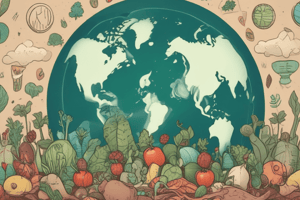Podcast
Questions and Answers
What is the primary outcome of composting food waste?
What is the primary outcome of composting food waste?
- Generation of energy
- Creation of nutrient-rich soil (correct)
- Production of methane
- Release of pollutants into the air
What is the primary greenhouse gas emitted during food waste decomposition in landfills?
What is the primary greenhouse gas emitted during food waste decomposition in landfills?
- Carbon dioxide
- Ozone
- Methane (correct)
- Nitrous oxide
What is a consequence of food waste contaminating waterways?
What is a consequence of food waste contaminating waterways?
- Increased oxygen levels in water
- Eutrophication of aquatic ecosystems (correct)
- Improved water quality
- Reduced greenhouse gas emissions
Which of the following is a recommended strategy for reducing food waste?
Which of the following is a recommended strategy for reducing food waste?
What is the estimated amount of CO2 equivalent emissions from global food waste?
What is the estimated amount of CO2 equivalent emissions from global food waste?
What is a consequence of improper waste disposal on soil health?
What is a consequence of improper waste disposal on soil health?
What is anaerobic digestion used for in waste management?
What is anaerobic digestion used for in waste management?
Which of the following is NOT a waste management strategy?
Which of the following is NOT a waste management strategy?
What is a benefit of sustainable waste management practices on soil health?
What is a benefit of sustainable waste management practices on soil health?
Flashcards are hidden until you start studying
Study Notes
Food Waste
Food Disposal Methods
- Composting: breaking down organic waste into nutrient-rich soil
- Landfilling: burying waste in landfills, often leading to methane production
- Incineration: burning waste to produce energy, releasing pollutants into the air
- Anaerobic digestion: microorganisms break down waste to produce biogas
Greenhouse Gas Emissions
- Food waste decomposition in landfills produces methane, a potent GHG (21x more potent than CO2)
- Estimated 3.3 billion tons of CO2 equivalent emissions from food waste globally
- Reducing food waste can help mitigate climate change
Water Pollution
- Food waste can contaminate waterways through agricultural runoff, sewage, and waste disposal
- Nutrient-rich waste can lead to eutrophication, harming aquatic ecosystems
- Water pollution affects human health, wildlife, and ecosystems
Waste Management Strategies
- Reduce: plan meals, shop wisely, and store food properly to prevent waste
- Reuse: donate excess food, use food scraps creatively, or feed animals
- Recycle: compost or anaerobically digest food waste
- Recovery: use waste as energy, animal feed, or fertilizer
Soil Pollution
- Improper waste disposal can lead to soil contamination, affecting soil health and fertility
- Heavy metals, pesticides, and pathogens can leach into soil, threatening ecosystems and human health
- Sustainable waste management practices can prevent soil pollution and maintain soil health
Food Waste
Food Disposal Methods
- Composting breaks down organic waste into nutrient-rich soil
- Landfilling waste leads to methane production, a potent GHG
- Incineration releases pollutants into the air, while producing energy
- Anaerobic digestion produces biogas through microorganisms breaking down waste
Greenhouse Gas Emissions
- Methane from food waste decomposition in landfills is 21x more potent than CO2
- Global food waste emissions estimated at 3.3 billion tons of CO2 equivalent
- Reducing food waste can mitigate climate change by decreasing GHG emissions
Water Pollution
- Food waste contaminates waterways through agricultural runoff, sewage, and waste disposal
- Nutrient-rich waste causes eutrophication, harming aquatic ecosystems and human health
- Water pollution affects ecosystems, wildlife, and human health
Waste Management Strategies
- Reduce food waste by planning meals, shopping wisely, and storing food properly
- Reuse excess food by donating, using scraps creatively, or feeding animals
- Recycle food waste through composting or anaerobic digestion
- Recover waste by using it as energy, animal feed, or fertilizer
Soil Pollution
- Improper waste disposal contaminates soil, affecting soil health and fertility
- Heavy metals, pesticides, and pathogens in soil threaten ecosystems and human health
- Sustainable waste management practices prevent soil pollution and maintain soil health
Studying That Suits You
Use AI to generate personalized quizzes and flashcards to suit your learning preferences.




